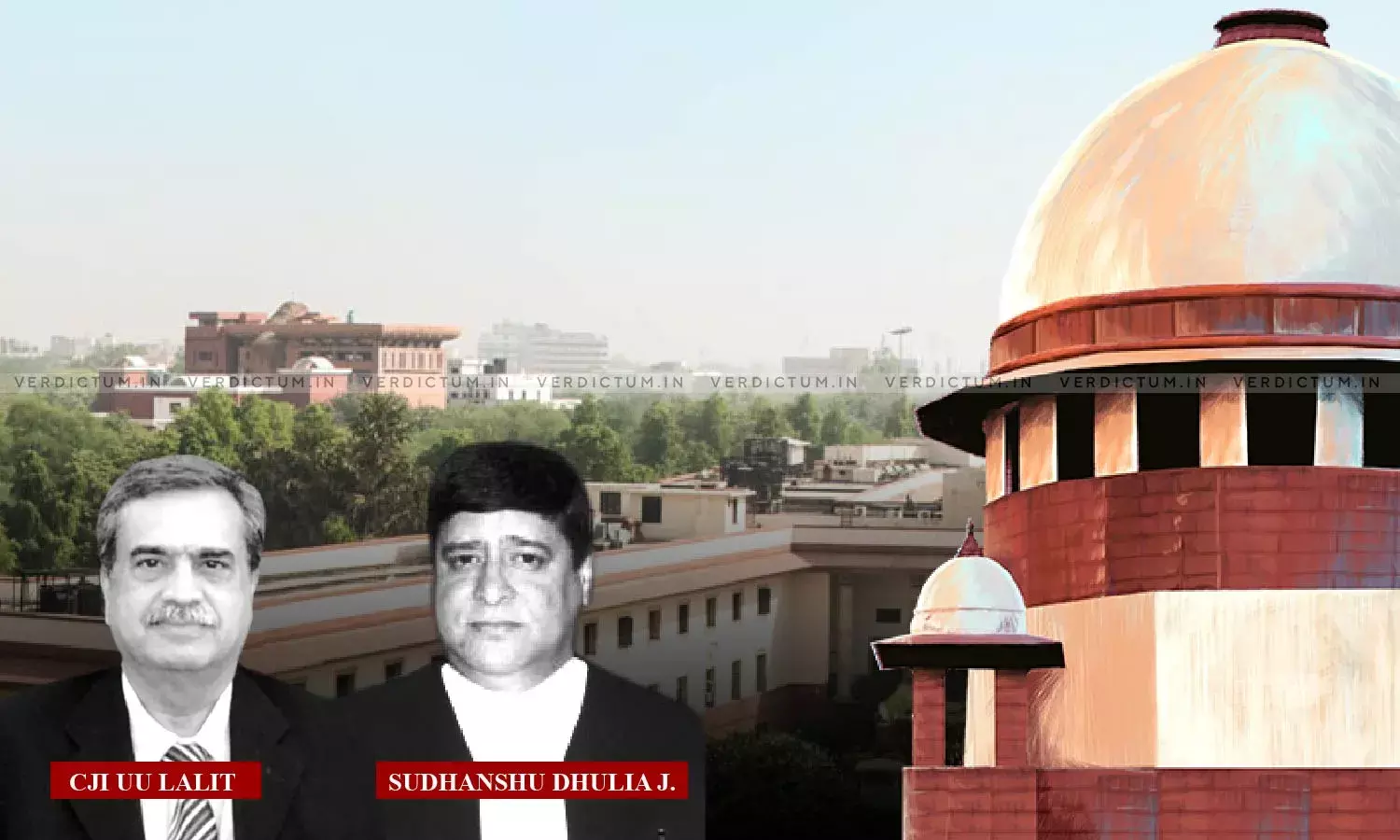Assessing Officer Cannot Make Addition In Respect Of Completed Assessment In Absence Of Incriminating Material: SC

Considering the issue regarding the jurisdiction of Revenue Officers in case of completed assessment, the Supreme Court ruled that no addition is permitted in respect of completed assessment in absence of any incriminating material.
While clarifying that the foundation for making search assessments under section 153A/153C of Income tax Act, 1961 can be said to be the existence of incriminating material showing undisclosed income detected as a result of search, the Two Judge Bench of Justice M.R Shah and Justice Sudhanshu Dhulia observed that "in respect of completed assessments/ unabated assessments, jurisdiction of Assessing Officer (AO) to make assessment is confined to incriminating material found during course of search under section 132 or requisition under section 132A of the 1961 Act".
Additional Solicitor General N. Venkataraman appeared for the Appellant (Revenue Department) and Advocate Arvind P. Datar, Kavin Gulati & Preteesh Kapoor appeared for the Respondent (Taxpayer).
In a nutshell, the Appellant had approached the Apex Court seeking assertion on the scope of assessment under section 153A and contending that the AO is competent to consider all the material that is available on record, including that found during the search, and make assessment of 'total income'. This was opposed by the Respondent (Taxpayer) and argued that, if no assessment proceeding is pending on the date of initiation of the search, the AO may consider only the incriminating material found during the search and is precluded from considering any other material derived from any other source.
After considering the submissions, the Supreme Court found from a plain reading of Section 153A, that once search or requisition is made, a mandate is cast upon the AO to issue notice under section 153 to the person, requiring him to furnish the return of income in respect of each assessment year falling within six assessment years immediately preceding the assessment year relevant to the previous year in which such search is conducted or requisition is made and assess or reassess the same.
“As per the provisions of Section 153A, in case of a search under section 132 or requisition under section 132A, the AO gets the jurisdiction to assess or reassess the 'total income' in respect of each assessment year falling within six assessment years. However, it is required to be noted that as per the second proviso to Section 153A, the assessment or re-assessment, if any, relating to any assessment year falling within the period of six assessment years pending on the date of initiation of the search under section 132 or making of requisition under Section 132A, as the case may be, shall abate”, added the Court.
While acting in agreement with the decision of the Delhi High Court in case of Commissioner of Income Tax, Central-III v. Kabul Chawla [(2015) 61 taxmann.com 412 (Delhi)] as well as the decision of Gujarat High Court in case of Principal Commissioner of Income Tax-4 Vs. Saumya Construction [(2016) 387 ITR 529 (Gujarat)], the Apex Court highlighted that as per Section 153A(2), if any proceeding initiated or any order of assessment or reassessment made under sub-section (1) has been annulled in appeal or any other legal proceeding, then, notwithstanding anything contained in sub-section (1) or section 153, the assessment or reassessment relating to any assessment year which has abated under the second proviso to subsection (1), shall stand revived with effect from the date of receipt of the order of such annulment by the Commissioner.
“Therefore, the intention of the legislation seems to be that in case of search only the pending assessment/reassessment proceedings shall abate and the AO would assume the jurisdiction to assess or reassess the 'total income' for the entire six years period/block assessment period. The intention does not seem to be to re-open the completed/unabated assessments, unless any incriminating material is found with respect to concerned assessment year falling within last six years preceding the search”, clarified the Court.
The Bench further observed that the assessment under section 153A is linked with the search and requisition under sections 132 and 132A of the 1961 Act, and the object of Section 153A is to bring under tax the undisclosed income which is found during course of search or pursuant to search or requisition.
Therefore, only in a case where the undisclosed income is found on basis of incriminating material, the AO would assume the jurisdiction to assess or reassess the total income for the entire six years block assessment period even in case of completed/unabated assessment, since as per the second proviso to Section 153A, only pending assessment/reassessment shall stand abated and the AO would assume the jurisdiction with respect to such abated assessments, opined the Bench.
Accordingly, the Bench concluded that in case of search under section 132 or requisition under section 132A, the AO assumes the jurisdiction for block assessment under section 153A, and all pending assessments/reassessments shall stand abated. In case any incriminating material is found/ unearthed, even, in case of unabated/completed assessments, the AO would assume the jurisdiction to assess or reassess the 'total income' taking into consideration the incriminating material unearthed during the search and the other material available with the AO including the income declared in the returns; and in case no incriminating material is unearthed during the search, the AO cannot assess or reassess taking into consideration the other material in respect of completed assessments/unabated assessments.
Meaning thereby, in respect of completed/unabated assessments, no addition can be made by the AO in absence of any incriminating material found during course of search under section 132 or requisition under section 132A, held the Bench.
Accordingly, the Court dismissed the appeals.
Cause Title: Principal Commissioner of Income Tax v. Abhisar Buildwell P. Ltd.
Click here to read /download the Judgment
